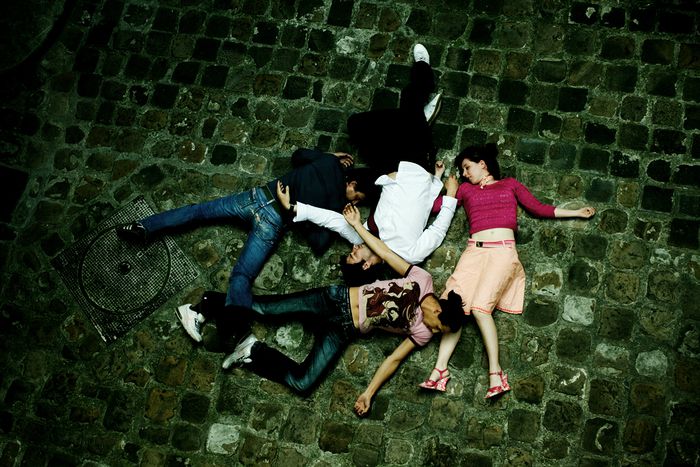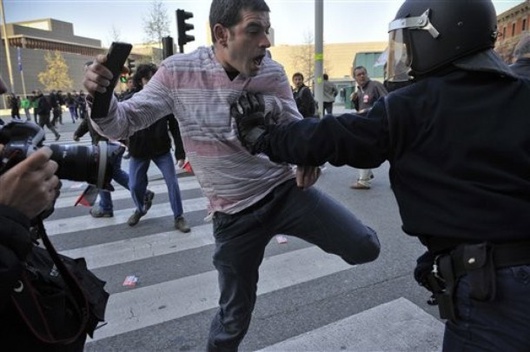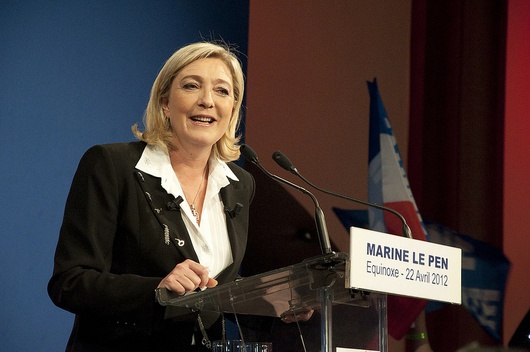
Europe: United we stand, divided we fall
Published on
|Opinion| On 9 May 1950, Robert Schuman said that Europe cannot be built in a day, but rather through events that require solidarity. But with euroscepticism rising and voter turnout declining, solidarity seems a world away. Where does this disillusion stem from, and what can we do to remedy it?
The biggest problem qualified youth face today appears to be that they are in jobs without quality contracts, no job security and no social benefits, and with increasing long-term unemployment, the youth of today risk becoming the unemployable adults of tomorrow. These labour conditions need to change, if we want to keep people in their country, and encourage development.
employers grind you down into a cheap labour force
But if in your home country there’s no jobs, no decent pay and impoverished living conditions, would you stay? If you spent years studying for a prestigious degree and ended up working for minimum wage as a part-time waiter, or a salesman, simply so you can have your own income, wouldn’t you decide to change things? If the hundreds of applications you send out to companies in other European countries are not bringing back even a single reply, wouldn’t you choose to leave? Would you sit back and let employers grind you down, into a cheap labour force that would accept anything simply because you “would be lucky to still have a job”?
pay and impoverished living conditions, would you stay? If you spent years studying for a prestigious degree and ended up working for minimum wage as a part-time waiter, or a salesman, simply so you can have your own income, wouldn’t you decide to change things? If the hundreds of applications you send out to companies in other European countries are not bringing back even a single reply, wouldn’t you choose to leave? Would you sit back and let employers grind you down, into a cheap labour force that would accept anything simply because you “would be lucky to still have a job”?
Youngsters are forced to leave not just their homes, but Europe altogether. Because, simply put, Europe is no longer what it was advertised to be. It no longer offers the opportunities for growth, for a brilliant career, for development and prosperity. It simply drowns you in bureaucracy, strict legislation, and forces you to abandon it, rather than suffocate inside its grasp.
Positive Discrimination
People in their late 30s and 40s acknowledge that “we are now living worse than our parents,” echoing EP President Martin Schulz’s statement of a lost generation. For although the EU’s programmes will help the youth find jobs and traineeships, it is not truly solving the problem. Positive discrimination is required to help countries in trouble recover and develop top-quality infrastructure, and as such the voices calling for “more solidarity” proliferate.
But EU member states have somehow lost the will to engage  with each other. They stopped caring about the interests and good of the collective and have reverted to the benefits of the nation instead. Nationalism is back on the agenda, and the crisis has allowed extremist parties to step up too, feeding off people’s discontent with the EU, the absence of solidarity and the lack of any outside help. Indeed, according to a recent Eurobarometer poll, the number of Europeans who distrust the European Union has doubled over the past six years to a record high of 58%.
with each other. They stopped caring about the interests and good of the collective and have reverted to the benefits of the nation instead. Nationalism is back on the agenda, and the crisis has allowed extremist parties to step up too, feeding off people’s discontent with the EU, the absence of solidarity and the lack of any outside help. Indeed, according to a recent Eurobarometer poll, the number of Europeans who distrust the European Union has doubled over the past six years to a record high of 58%.
In fact, many citizens see EU institutions as pernicious and overbearing in national public life. Many do not understand why so much money is spent for EU officials to live in luxury and to have everything funded by the member states, when they themselves demand further cuts and measures to reduce wages and benefits in EU countries. Or why for example, so many decisions take place behind closed doors, with no accountability and no transparency. EU officials are seen as too distant from reality.
insulated from reality
Hidden behind reports, dossiers, proposals and regulations, they are so deep in paperwork that they do not look beyond it, into their societies, to see how people really live. How all these decisions that they vote upon in those huge and luxurious buildings actually affect the lives of ordinary citizens. Those very citizens that elected them to these posts – albeit in most cases indirectly - and who continue to make sacrifices on the altar of austerity, lowering their hopes and expectations and vanishing their dreams, as their politicians continue to live insulated in the “European capital” (Brussels), away from the painful reality of the world.
 But it is time to step out of that bubble. EU officials should be more accessible to their constituents. To the people who placed them there in the first place. They should be more transparent in their decisions and look to see how their proposals will impact their people. To behave as true leaders and struggle with their people, fighting to give each one a voice. If the upcoming EU elections are indeed “going to be different this time,” then MEPs should listen to citizens calling for greater access to information in order to tackle the EU's "democratic deficit."
But it is time to step out of that bubble. EU officials should be more accessible to their constituents. To the people who placed them there in the first place. They should be more transparent in their decisions and look to see how their proposals will impact their people. To behave as true leaders and struggle with their people, fighting to give each one a voice. If the upcoming EU elections are indeed “going to be different this time,” then MEPs should listen to citizens calling for greater access to information in order to tackle the EU's "democratic deficit."
Europe has lost its way. It has allowed a crisis to enter its core and erode it from the inside, because its people too have lost their way. They have allowed their national, self-centred issues to take over their collective European identity. An identity that is only as strong as its people united. EU officials proclaim reforms need to take place in order for things to change in Europe and for the EU to get back on track. But the restructuring must also take part in the heart of the EU, in its organization and its institutions. In the way EU officials operate. They too should accept pay cuts, and the austerity measures they often impose on other countries. Because the EU is in essence the product of its member states. And if one family member is hurt, then the rest of the group should rally to its rescue. The EU has forgotten what it means to act as a family. To stand by its people and to listen when they have something to say. To accept their grievances together with their compliments and to try to become better in order for its unity to become stronger. A united identity is what is missing from the EU today. And a multi-lingual saying in this case is true – “unity is strength”. If the European member states can rediscover the priorities and aims that brought them together in the first place, then the EU that Schuman envisioned 54 years ago will finally become a reality.



